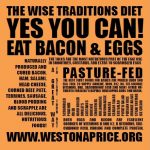What is a “Wise Traditions”, “Weston Price” or “Traditional” diet?
At its most basic, it is about eating foods that would have been recognized by our ancestors, because these are the foods that are still recognized by our bodies as food.
There is no ONE “Weston Price” diet. Those of us following a Weston-Price-inspired-diet apply the principles that Dr. Price observed about healthy populations. It is the principles of traditional diets that form the basis of our dietary choices. We pull cuisine and inspiration from many different cultures, as well as creating our own recipes. We eat from a wide variety of foods that are available to us, and chose ones that suit our tastes, our budget and our own unique body’s tolerances.
Dr. Weston A. Price traveled around the world in the 1930’s and found 14 groups of healthy people who were eating their traditional diets. He was able to study these groups before modern foods (which he called the “Displacing Foods of Modern Commerce”) had infiltrated their cultures. He also had the opportunity to study neighboring tribes and towns that had access to modern foods. He documented the devastating results that modern foods had on the health of people all across the globe. Dr. Price also took samples of traditional foods back to his laboratory and analyzed nutrient contents. He compared traditional foods to modern diets of his time, and found that traditional people were consuming at least four times the water-soluble vitamins, calcium and other minerals, and at least TEN times the fat-soluble vitamins, from animal foods such as butter, fish eggs, shellfish, organ meats, eggs and animal fats.
The healthy diets he observed were as varied as the people and the land. The cultures included hunter-gatherer societies as well as people practicing herding, and farming. The diets encompassed a wide variety of plant and animal-life and ranged from almost exclusively meat-based diets, to fairly low in animal foods. Although he searched for one, he was unable to find any healthy culture thriving on completely vegetarian (vegan) diets. Some societies included dairy and grains others did not. Dr. Price found that although the foods differed greatly between cultures, they all contained large amounts of vitamins and minerals.
For more info see: Yes We Can!, Yes You Can!, Principles of Healthy Diets, Dietary Guidelines & Shopping Guide Categories
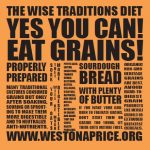 Does a “Weston Price diet” include grains?
Does a “Weston Price diet” include grains?
Yes, it can. We encourage the proper preparation of whole grain, nuts, seeds and legumes. Traditional people took great care with the preparation of grains. Proper preparation techniques include soaking, sprouting and sourdough fermentation. Many people who previously had difficulties with grains find that they can consume them when they have been properly prepared. Some people will need to improve their digestion and eliminate allergies before they are able to tolerate grains.
For more info see: Grains, Legumes, Nuts
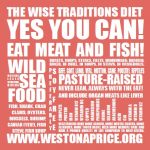 Does a “Weston Price diet” include meat?
Does a “Weston Price diet” include meat?
Yes. It is considered Dr. Price’s greatest disappointment that he was unable to find examples of healthy vegan cultures. All healthy cultures he studied used some animal foods. The amounts in these societies varied greatly depending on climate and availability. For some cultures insects were the primary animal food consumed, most included beef, lamb, goat, pork, poultry, wild game, fish and seafood.
We encourage the use of grass-fed and pasture-raised beef, lamb, pork, and poultry, as well as wild game, and wild-caught fish and shellfish. More importantly we encourage the use of the whole animal, not just the lean meat. Traditional people consumed the organs, skin, bones and fat. Our chapter teaches recipes such as “Chicken Liver Divine”, “Easy Soup Stock”, and “Holiday Sausage” to help members take advantage of the wonderful nourishing powers of these foods. Using the whole animal is not only more cost effective and respectful to the animal, but modern science shows us that the organs, skin, bones and fat contain many important nutrients that are not readily available elsewhere.
For more info see: Meats & Poultry
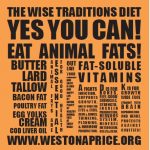 Does a “Weston Price diet” include fats and oils?
Does a “Weston Price diet” include fats and oils?
Yes. This is the main difference between our recommendations and most other nutritional strategies. In contrast to the modern low-fat fad diet proponents, we know that traditional people valued fat and went to great effort and risk to insure that they had enough of it. Butter, lard, tallow, coconut oil, palm oil, olive oil, are all wonderful fats and oils to include in the diet. Cold-pressed flax or other fragile polyunsaturated oils are suitable for some people in small amounts. Fat content of traditional diets ranged from 30% to 80% of calories, but only a small percentage was from polyunsaturated oils. Most fat in traditional diets was the saturated and monounsaturated fats from animals and tropical oils. Fat is not optional, it is essential!
For more info see: Fats & Oils
Does a “Weston Price diet” include eggs?
Yes. Pasture-raised eggs are a wonderful source of nutrients. Fears about dietary cholesterol are unfounded. Eggs contain important nutrients and fat-soluble vitamins. We encourage consuming pasture-raised eggs as often as you wish in any way you like.
For more info see: Pastured Eggs
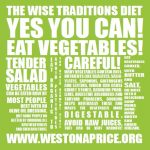 Does a “Weston Price diet” include vegetables and fruits?
Does a “Weston Price diet” include vegetables and fruits?
Yes. We encourage organic, biodynamic, local and homegrown vegetables whenever possible. Vegetables may be cooked, raw, juiced and fermented. They are wonderful blended into soups and stews, steamed and served with butter, in salads with home-made dressing and many more ways. The Eugene Chapter frequently teaches classes on cooking and fermenting vegetables.
For more info see: Vegetables & Fruits & Fermented Foods
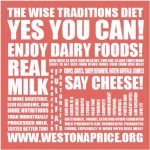 Does a “Weston Price diet” include dairy?
Does a “Weston Price diet” include dairy?
Yes, it can. We encourage the use of unprocessed (raw) dairy products from healthy grass-fed cows or pasture-raised goats. Traditional people consumed milk fresh, but also in the form of cheese and in a great variety of cultured dairy products. Not all cultures that Dr. Price studied included dairy, but those that did greatly valued the milk and butter from animals that were grazing on rapidly growing green grass.
For more info see: Raw Milk
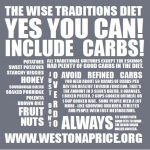 Does a “Weston Price diet” include carbs?
Does a “Weston Price diet” include carbs?
Yes, it can. This is not a low-carb diet. Traditional people consumed a variety of carbohydrate foods. We encourage the use of plenty of vegetables, natural sweeteners, grains and tubers. By the standards of the modern low-fat-diet this way of eating is lower in carbohydrates due to the fact that when you raise one portion of the diet (fats), by percentage the others go down (carbohydrates). We encourage the elimination of refined sources of carbohydrates such as white flour, white sugar and high fructose corn syrup.
We also recognize that everyone will need to find, their own macro-nutrient balance. People with diabetes, Alzheimer’s, or other forms of hyperinsulinemia may need to reduce carbohydrates. The Eugene Chapter holds a Keto Support Group for people who are following the Keto diet and wish to incorporate Wise Traditions principles.
For more info see: Weston A. Price Foundation response to the USDA Food Pyramid, Adventures in Macro-Nutrient Land, The Hidden Problem of Chronic Hyperinsulinemia, Understanding and Managing Type 2 Diabetes, Type 3 Diabetes: Metabolic Causes of Alzheimer’s Disease, & Low-carb high-fat (LCHF) diet on trial
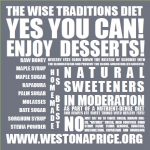 Does a “Weston Price diet” include sweets?
Does a “Weston Price diet” include sweets?
Yes, it can. This is not a diet of deprivation (and if you’ve ever attended one of our annual conferences you know what I am talking about!). We encourage the use of natural sweeteners in moderation. Natural sweeteners include sucanat, honey, maple syrup, stevia, coconut sugar, palm sugar, and more.
For more info see: Replacing Refined Sugars with Natural Sugars One Step At a Time & Natural Sweeteners (coming soon)
Is there anything the Weston Price diet doesn’t include?
Yes. Fake and processed food! We warn against the dangers of processed, refined foods. Pasteurized dairy from confinement animals, artificial colorings, preservatives, MSG, white flour, white sugar, refined vegetable oils, GMOs, high fructose corn syrup, and modern soy foods are a few examples of modern so-called “foods” that were never consumed by traditional people and are contributing to the modern “diseases of civilization”.
For more info see: Modern Foods
What if I can’t handle some of these foods?
We frequently find that after years (or sometimes generations) of consuming modern foods there are people who are unable to tolerate certain traditional foods. It might be milk, it might be meat, it might be fats, eggs, grains, or even vegetables. If your individual body has trouble with any of the traditional foods, we encourage you to work with a knowledgeable health practitioner to learn what your body is trying to tell you. You may have digestive issues. You may need to increase your hydrochloric acid (stomach acid) so that your body is able to digest food properly. You may need to support your gall bladder in order to digest fats properly. You may need to avoid certain foods for a period of time to allow your gut to heal. For people in the healing process the GAPS program can be very helpful. For more info see: Gut and Psychology Syndrome by Natasha Campbell-McBride & our GAPS page, and our posts on GAPS. For people who are insulin resistant (hyperinsulinemia) a Wise Traditions version of a Keto diet may be helpful. We have monthly Keto Support Group meetings.
We encourage you to not settle for avoiding these foods for the rest of your life. We encourage you not to be limited, and to aim for including as many nutrient-dense whole natural foods as possible in your diet.
See Also:
- Are you really eating a nutrient dense diet? (And would Dr. Price approve?)
- From the above article, here is a downloadable PDF, which shows some of the nutrient-dense foods we should include in our diet on a regular basis according to Dr. Price’s research.
For more info:
- Weston A. Price Foundation Beginner Tour
- Principles of Healthy Diets
- Healthy 4 Life
- A Wise Diet – Wise Traditions Podcast #162
Download Healthy 4 Life:


